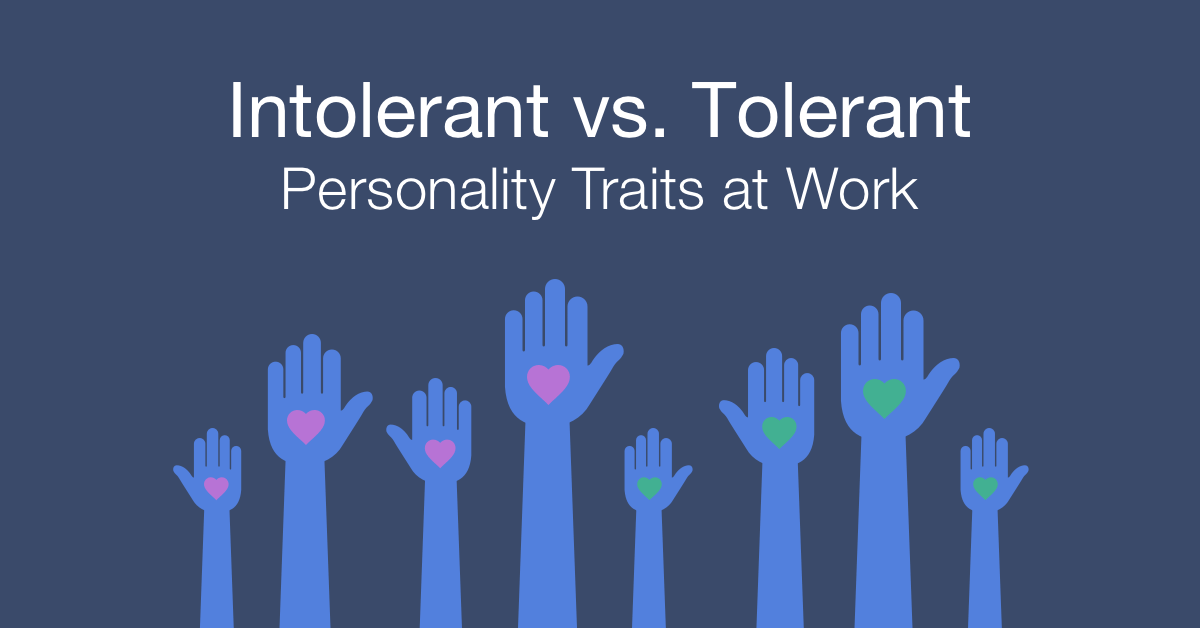Intolerant vs. Tolerant Personality Traits
Interviewer's Guide
- Personality Temperament History
- Understanding the 4 Personality Types
- Influence of Secondary Personality Temperament
- Trait Scales Overview
- Defining the Traits
- Personality Profile Reports
- Integrity Test Interviewer's Report
- Skills and Aptitude Test Reports
- Applying the concept of baseline files
- Parity Index
- Management involvement
- Covering the bases - legal aspects to consider

Conversationally, we talk about a tolerant person as one who is accepting and open-minded. But as personality traits, tolerance and intolerance take on different meanings. Whether someone is tolerant or intolerant also affects how that person operates within the workplace.
What is the intolerant personality trait?
Someone with this trait tends to know the rules, follow them, and expect others to do likewise. They have high expectations for themselves and for their co-workers.
Intolerance and tolerance both occur on a spectrum. Some people may have a slight tendency towards intolerance that mostly affects their own working style, while others may be extremely rigid in their dealings with others. A person’s overall personality type will also influence how their intolerance plays out.
What are the characteristics of an intolerant person?
A few signs that a person has the intolerant personality trait:
- They have a deep knowledge of rules and procedures.
- They follow the rules and expect others to do likewise, with little flexibility.
- They grow impatient with people who make mistakes, especially repeatedly.
- They have high standards and expect others to share those standards.
How to work with an intolerant person
People with a tendency towards intolerance can thrive at all levels of an organization. Here are a few tips for helping these people succeed.
How to train an intolerant person- Talk through instances that require or allow for flexibility. Someone who is intolerant will tend to take the rules and processes you introduce literally; if there’s wiggle room or areas that require a judgment call, be clear.
- Enforce the rules evenly when possible. It’s demoralizing for intolerant employees to follow directions carefully, only to see others ignoring them. Of course, there will be instances that require flexibility, but this should be a conscious choice, not the result of management being negligent.
- By the same token, if you have guidelines that half your employees ignore without consequence, just get rid of the rule. It’s not worth the stress it causes to the natural rule-followers on your team.
- Explain how your feedback fits within existing rules and infrastructure, which they’ll naturally gravitate towards. These might include a handbook, a mission statement, or a project outline.
- Intolerant people tend to have high expectations for themselves. Depending on their other personality traits (see all of the descriptions here), they may have a tough time swallowing feedback -- or they may crave it as a way to improve. Get a feel for your employees’ natural response to feedback and give them the space they need to process it in their own time.
What is the opposite of intolerant?
On the other hand, some people tend to be tolerant: open, flexible, and willing to make allowances to get the job done.
What does it mean to be tolerant in the workplace?
Someone who is tolerant is much more apt to bend the rules (or, in the extreme, may not even think the rules apply). They’re generally more focused on the end result than following a certain playbook to get there.
What are the characteristics of a tolerant person?
Some examples of things you may notice with a tolerant person:
- They’re able to effectively circumvent the established process to get things done.
- They don’t mind bending the rules when it’s necessary, and it doesn’t bother them when others do they same. To them, the rules are made to serve the business, not vice versa.
- They’re forgiving when someone else makes a mistake, even repeatedly.
- In the extreme, tolerant managers may take too long to address performance issues, leading to bigger problems down the road.
How to work with a tolerant person
Tolerant people tend to be characterized by their peers as easy to work with, especially depending on their overall personality type. Knowing how to manage, hire, and collaborate with tolerant people can help you get the most out of your professional relationship.
How to train a tolerant employee- Emphasize the thought process behind rules, guidelines, and procedures. This will help your tolerant employees make smart judgement calls about when to bend a rule (and when not to).
- If you get the sense that your employee is tolerant to a fault, put figurative red flags up around the rules that really have no flexibility. (Anything that helps ensure safety and maintain legality should be underscored, for example.)
- A tolerant employee will chafe under rules they feel are unnecessary or overly restrictive. Look at where you can offer employees in your workplace more freedom.
- Foster a workplace atmosphere where diversity of thought and opinion is embraced.
- If you yourself tend towards intolerance, be mindful of that personality difference when you give feedback. Ask: Is this really an issue that affects business, or is this person just doing things differently that you would?
- Focus on the bottom line and most important business goals when you give feedback. The point isn’t “You didn’t follow the rules,” but “The end result is not up to par.”
Which is a better worker: intolerant vs. tolerant?
People with intolerant and tolerant personality traits bring different strengths into their work. Take all of the personality trait descriptions into account when you’re looking at training, hiring, and managing people. This trait is just one facet of personality to consider.